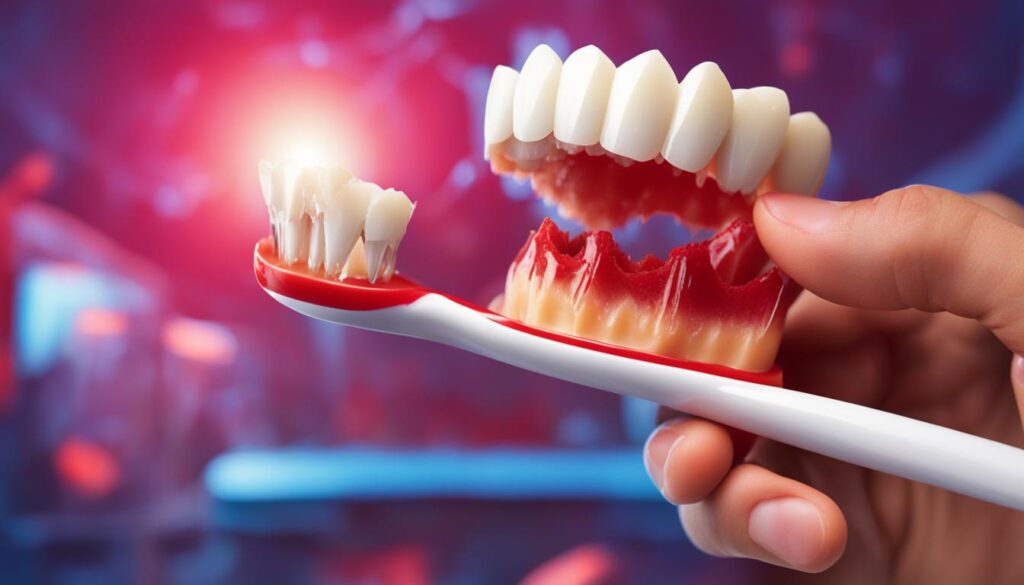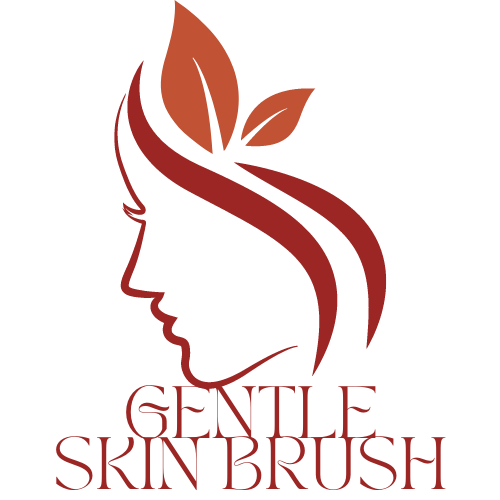Do you ever experience tooth pain when brushing? The sensation you feel could be due to sensitive tooth nerves. It’s a common occurrence that can be caused by various factors. Understanding why you can feel tooth nerve when brushing teeth is essential in finding effective solutions to alleviate the discomfort.
Contents
Key Takeaways:
- Tooth nerve pain while brushing teeth is a common experience.
- The nerves inside our teeth can become exposed and sensitive.
- Possible causes include cracked teeth, gum disease, tooth grinding, and poor oral hygiene.
- Avoiding trigger foods and drinks can help reduce tooth nerve pain.
- Proper oral care practices and regular dental checkups are crucial for managing tooth sensitivity.
The Anatomy of Tooth Nerve Pain
Understanding the anatomy of tooth nerve pain is crucial for comprehending why brushing your teeth can sometimes cause discomfort. Each tooth is composed of four main parts: enamel, cementum, dentin, and pulp.
Enamel: This is the outermost layer of the tooth and serves as a protective barrier. It is the hardest substance in the human body and helps shield the tooth from external forces.
Cementum: Located beneath the gumline, cementum covers the tooth’s roots and aids in anchoring the tooth to the jawbone.
Dentin: Below the enamel and cementum lies the dentin, which is softer and less dense. Dentin contains microscopic tubules that connect to the tooth’s pulp.
Pulp: The pulp is located deep within the tooth and houses the sensitive nerves and blood vessels. It is the innermost layer of the tooth.
When enamel wears away or the gums recede, the dentin can become exposed, leading to tooth sensitivity. This exposure of the dentin allows external stimuli, such as temperature changes or pressure from brushing, to reach the tooth’s nerves, resulting in discomfort.
Causes of Tooth Nerve Pain
There are several factors that can contribute to tooth nerve pain while brushing. Understanding these causes can help you identify potential triggers and take appropriate measures to alleviate the discomfort. Here are some common causes:
- Cracked Teeth: Cracks in your teeth can expose the sensitive nerves inside, making them more susceptible to pain when brushing. Avoid chewing on hard objects and seek dental treatment for cracked teeth.
- Gum Disease: Gum disease, such as gingivitis or periodontitis, can cause the gums to recede, exposing the tooth roots and nerves. Proper oral hygiene, including regular brushing and flossing, can help prevent gum disease.
- Tobacco Use: Smoking or using tobacco products can damage your teeth and gums, leading to increased tooth sensitivity. Quitting tobacco can help improve your oral health and reduce nerve pain.
- Tooth Grinding: Grinding or clenching your teeth, known as bruxism, can wear down the enamel and expose the underlying dentin and nerves. Wearing a mouthguard at night and managing stress can help alleviate tooth grinding.
- Sugary Foods: Consuming excessive amounts of sugary foods and drinks can increase the risk of tooth decay, which can result in nerve pain. Limit your intake of sugary snacks and opt for healthier alternatives.
- Poor Oral Hygiene: Neglecting proper oral care practices, such as brushing and flossing regularly, can lead to tooth decay and gum disease. Practicing good oral hygiene is crucial for maintaining healthy teeth and gums.
Understanding the causes of tooth nerve pain can help you make informed decisions about your oral health. By adopting good oral care practices, addressing underlying issues, and avoiding trigger factors, you can reduce tooth sensitivity and improve your overall dental well-being.
Remember, if you experience persistent or severe tooth nerve pain, it is important to consult with a dentist who can provide a professional diagnosis and recommend appropriate treatment options for your specific situation.
Foods to Avoid to Reduce Tooth Nerve Pain

When it comes to tooth sensitivity and brushing, it’s important to be mindful of the foods and drinks that can exacerbate the problem. By avoiding certain triggers, you can reduce the discomfort caused by exposed nerves while brushing your teeth. Let’s take a look at some common culprits that may contribute to tooth sensitivity and tips on how to minimize their impact.
Cold and Hot Items
Both cold and hot food and drinks can stimulate tooth nerves, causing sensitivity during brushing. To minimize this discomfort, it’s advisable to avoid extreme temperature changes while eating or drinking. Try to opt for lukewarm or room temperature beverages and allow hot foods to cool slightly before consuming them. By taking these simple precautions, you can help protect your sensitive tooth nerves from unnecessary stimulation.
Sugary and Acidic Foods
Sugary and acidic foods can contribute to enamel erosion, which can make your tooth nerves more vulnerable to sensitivity. Limit your consumption of sugary desserts, sodas, and sports drinks, as well as acidic foods like citrus fruits and tomato-based products. If you do indulge in these treats, make sure to brush your teeth afterward to remove any residue and reduce the risk of sensitivity.
Consult with a Dentist for Personalized Advice
While avoiding certain foods can help reduce tooth sensitivity, it’s important to seek guidance from a dental professional for a proper diagnosis and personalized treatment plan. A dentist can evaluate the underlying cause of your tooth nerve pain and recommend appropriate solutions tailored to your specific needs. Regular dental checkups and cleanings are also crucial for maintaining good oral health and minimizing tooth sensitivity.
By being mindful of the foods and drinks that can trigger tooth nerve pain, you can take proactive steps to alleviate discomfort while brushing your teeth. Remember to consult with a dentist for professional advice and to establish a comprehensive oral care routine that promotes healthy teeth and gums.
| Foods to Avoid | Tips to Minimize Tooth Sensitivity |
|---|---|
| Cold and hot items | Opt for lukewarm or room temperature beverages and allow hot foods to cool slightly before consuming them. |
| Sugary and acidic foods | Limit consumption of sugary desserts, sodas, sports drinks, citrus fruits, and tomato-based products. Brush your teeth after indulging to remove residue. |
Treating and Preventing Tooth Nerve Pain
Treating and preventing tooth nerve pain requires consistent and proper oral care practices. By following these steps, you can alleviate discomfort and maintain a healthy smile.
1. Good Oral Hygiene
The foundation of preventing tooth nerve pain is maintaining good oral hygiene. Brush your teeth at least twice a day using a soft-bristled toothbrush and fluoride toothpaste. Be gentle while brushing to avoid further irritation to the nerves. Additionally, floss your teeth daily to remove plaque and bacteria from hard-to-reach areas.
2. Regular Dental Checkups
Schedule regular dental checkups with your dentist to address any underlying dental issues. Your dentist can identify early signs of tooth decay, gum disease, or other problems that may contribute to tooth nerve pain. They can provide professional treatments such as fillings or root canals to address severe cases of infection or decay that are causing dental pain when brushing.
3. Use Sensitive Teeth Products
If you experience tooth sensitivity while brushing, consider using oral care products specifically designed for sensitive teeth. Desensitizing toothpaste and mouthwash can help reduce nerve sensitivity by blocking pain signals to the brain. Use these products as directed and consult with your dentist if you have any concerns.
4. Avoid Trigger Foods and Drinks
Certain foods and drinks can aggravate tooth nerve pain, so it’s important to avoid them. Hot and cold items, such as ice cream or hot coffee, can trigger sensitivity if the nerves are exposed while brushing. Acidic and sugary foods can contribute to enamel erosion and increase the risk of tooth sensitivity. Limit your consumption of these items to prevent further discomfort.
“Preventing tooth nerve pain is all about practicing good oral hygiene, visiting your dentist regularly, using appropriate oral care products, and avoiding trigger foods and drinks.”
By following these steps, you can effectively manage and prevent tooth nerve pain. Remember to consult with your dentist for a proper diagnosis and personalized treatment plan based on your specific needs. Taking care of your oral health not only reduces tooth sensitivity while brushing but also promotes overall dental wellness for a confident smile.
Conclusion
Tooth nerve pain while brushing can be a distressing experience, but understanding its causes and taking appropriate measures can help alleviate discomfort and improve your oral health. By familiarizing yourself with the anatomy of tooth nerve pain and its triggers, you can take proactive steps to prevent and manage dental pain when brushing.
Maintaining good oral hygiene practices, such as brushing your teeth at least twice a day and flossing daily, is crucial. Additionally, regular dental checkups allow for early detection and treatment of underlying dental issues that may contribute to tooth sensitivity and pain.
When experiencing tooth nerve pain, it’s important to consult with a dentist for a proper diagnosis and personalized treatment plan. Dentists may recommend treatments like fillings or root canals for cavities or severe decay. Using specially formulated oral care products for sensitive teeth, such as desensitizing toothpaste and mouthwash, can also provide relief.
By adopting a comprehensive approach to oral care and taking measures to avoid trigger foods and drinks, you can significantly reduce tooth sensitivity and dental pain when brushing. Prioritize your oral health to enjoy a pain-free brushing experience and maintain a healthy smile.
FAQ
Why can I feel tooth nerve when brushing teeth?
Tooth nerve pain is a common sensation that can occur when the nerves inside your teeth become exposed and sensitive to brushing and movement.
What is the anatomy of tooth nerve pain?
Each tooth consists of enamel, cementum, dentin, and pulp. Dentin contains microscopic tubules that connect to the tooth’s nerves, making it sensitive to stimuli.
What causes tooth nerve pain?
Tooth nerve pain can be caused by factors such as cracked teeth, gum disease, tobacco use, tooth grinding, sugary foods, and poor oral hygiene.
What foods should I avoid to reduce tooth nerve pain?
It is recommended to avoid hot and cold, sugary and sweet, and acidic and sour items, as they can trigger tooth sensitivity while brushing.
How can I treat and prevent tooth nerve pain?
Maintaining good oral care practices, visiting a dentist regularly, using oral care products for sensitive teeth, and avoiding trigger foods and drinks can help alleviate tooth sensitivity.





Leave a Reply